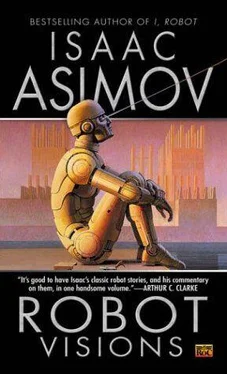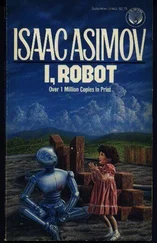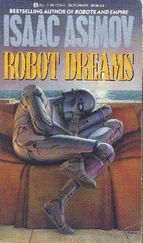Isaac Asimov - Robot Visions
Здесь есть возможность читать онлайн «Isaac Asimov - Robot Visions» весь текст электронной книги совершенно бесплатно (целиком полную версию без сокращений). В некоторых случаях можно слушать аудио, скачать через торрент в формате fb2 и присутствует краткое содержание. Жанр: Фантастика и фэнтези, на английском языке. Описание произведения, (предисловие) а так же отзывы посетителей доступны на портале библиотеки ЛибКат.
- Название:Robot Visions
- Автор:
- Жанр:
- Год:неизвестен
- ISBN:нет данных
- Рейтинг книги:5 / 5. Голосов: 1
-
Избранное:Добавить в избранное
- Отзывы:
-
Ваша оценка:
- 100
- 1
- 2
- 3
- 4
- 5
Robot Visions: краткое содержание, описание и аннотация
Предлагаем к чтению аннотацию, описание, краткое содержание или предисловие (зависит от того, что написал сам автор книги «Robot Visions»). Если вы не нашли необходимую информацию о книге — напишите в комментариях, мы постараемся отыскать её.
Robot Visions — читать онлайн бесплатно полную книгу (весь текст) целиком
Ниже представлен текст книги, разбитый по страницам. Система сохранения места последней прочитанной страницы, позволяет с удобством читать онлайн бесплатно книгу «Robot Visions», без необходимости каждый раз заново искать на чём Вы остановились. Поставьте закладку, и сможете в любой момент перейти на страницу, на которой закончили чтение.
Интервал:
Закладка:
At any rate, I spoke to Archie a few days later, when my own work assignments left me some free time. Archie knew nothing about training or about academic distinctions. To him, I was a man and a master, like any other man and master, and he spoke to me as such.
I said to him, “How did these people of the future regard the people of their past? Were they censorious? Did they blame them for their follies and stupidities?”
Archie said, “They did not say anything to make me feel this, sir. They were amused by the simplicity of my construction and by my existence, and it seemed to me they smiled at me and at the people who constructed me, in a good-humored way. They themselves had no robots.”
“No robots at all, Archie?”
“They said there was nothing comparable to myself, sir. They said they needed no metal caricatures of humanity.”
“And you didn’t see any?”
“None, sir. In all my time there, I saw not one.”
I thought about that a while, then said, “What did they think of other aspects of our society?”
“I think they admired the past in many ways, sir. They showed me museums dedicated to what they called the ‘period of unrestrained growth. ‘ Whole cities had been turned into museums.”
“You said there were no cities in the world of two centuries hence, Archie. No cities in our sense.”
“It was not their cities that were museums, sir, but the relics of ours. AU of Manhattan Island was a museum, carefully preserved and restored to the period of its peak greatness. I was taken through it with several guides for hours, because they wanted to ask me questions about authenticity. I could help them very little, for I have never been to Manhattan. They seemed proud of Manhattan. There were other preserved cities, too, as well as carefully preserved machinery of the past, libraries of printed books, displays of past fashions in clothing, furniture, and other minutiae of daily life, and so on. They said that the people of our time had not been wise but they had created a firm base for future advance.”
“And did you see young people? Very young people, I mean. Infants?”
“No, sir.”
“Did they talk about any?”
“No, sir.”
I said, “Very well, Archie. Now, listen to me-”
If there was one thing I understood better than the Temporalists, it was robots. Robots were simply black boxes to them, to be ordered about, and to be left to maintenance men-or discarded-if they went wrong. I, however, understood the positronic circuitry of robots quite well, and I could handle Archie in ways my colleagues would never suspect. And I did.
I was quite sure the Temporalists would not question him again, out of their newfound dread of interfering with time, but if they did, he would not tell them those things I felt they ought not to know. And Archie himself would not know that there was anything he was not telling them.
I spent some time thinking about it, and I grew more and more certain in my mind as to what had happened in the course of the next two centuries.
You see, it was a mistake to send Archie. He was a primitive robot, and to him people were people. He did not-could not-differentiate. It did not surprise him that human beings had grown so civilized and humane. His circuitry forced him, in any case, to view all human beings as civilized and human; even as god-like, to use an old-fashioned phrase.
The Temporalists themselves, being human, were surprised and even a bit incredulous at the robot vision presented by Archie, one in which human beings had grown so noble and good. But, being human, the Temporalists wanted to believe what they heard and forced themselves to do so against their own common sense.
I, in my way, was more intelligent than the Temporalists, or perhaps merely more clear-eyed.
I asked myself if population decreased from ten billion to one billion in the course of two centuries, why did it not decrease from ten billion to zero? There would be so little difference between the two alternatives.
Who were the billion who survived? They were stronger than the other nine billion, perhaps? More enduring? More resistant to privation? And they were also more sensible, more rational, and more virtuous than the nine billion who died as was quite clear from Archie’s picture of the world of two hundred years hence.
In short, then, were they human at all?
They smiled at Archie in mild derision and boasted that they had no robots; that they needed no metal caricatures of humanity.
What if they had organic duplicates of humanity instead? What if they had humaniform robots; robots so like human beings as to be indistinguishable from them, at least to the eyes and senses of a robot like Archie? What if the people of the future were humaniform robots, all of them, robots that had survived some overwhelming catastrophe that human beings had not?
There were no babies. Archie had seen none. To be sure, population was stable and long-lived on Earth, so there would be few babies in any case. Those few would be taken care of, made much of, be well-guarded, and might not be distributed carelessly through society. But Archie had been on the Moon for two months and population there was growing-and he had still seen no babies.
Perhaps these people of the future were constructed rather than born.
And perhaps this was a good thing. If human beings had died out through their own rages, hatreds, and stupidities, they had at least left behind a worthy successor; a kind of intelligent being that valued the past, preserved it, and moved on into the future, doing their best to fulfill the aspirations of humanity, in building a better, kinder world and in moving out into space perhaps more efficiently than we “real” human beings would have.
How many intelligent beings in the Universe had died out leaving no successor? Perhaps we were the first ever to leave such a legacy.
We had a right to feel proud.
Ought I to tell all this to the world? Or even to the Temporalists? I did not consider that for a moment.
For one thing, they were likely not to believe me. For another, if they did believe me, in their rage at the thought of being replaced by robots of any kind, would they not turn on them and destroy every robot in the world and refuse ever to build others? This would mean that Archie’s vision of the future, and my own vision, would never come to pass. That, however, would not stop the conditions that were to destroy humanity. It would just prevent a replacement; stop another group of beings, made by humans and honoring humans, from carrying human aspirations and dreams through all the Universe.
I did not want that to happen. I wanted to make sure Archie’s vision, and my own improvement of it, would come to pass.
I am writing this, therefore, and I will see to it that it will be hidden, and kept safe, so that it will be opened only two hundred years from now, a little sooner than the time at which Archie will arrive. Let the humaniform robots know that they should treat him well and send him home safely, carrying with him only the information that would cause the Temporalists to decide to interfere with Time no more, so that the future can develop in its own tragic/happy way.
And what makes me so sure I am right? Because I am in a unique position to know that I am.
I have said several times that I am inferior to the Temporalists. At least I am inferior to them in their eyes, though this very inferiority makes me more clear-eyed in certain respects, as I have said before, and gives me a better understanding of robots, as I have also said before.
Because, you see, I, too, am a robot.
I am the first humaniform robot, and it is on me and on those of my kind that are yet to be constructed that the future of humanity depends.
Читать дальшеИнтервал:
Закладка:
Похожие книги на «Robot Visions»
Представляем Вашему вниманию похожие книги на «Robot Visions» списком для выбора. Мы отобрали схожую по названию и смыслу литературу в надежде предоставить читателям больше вариантов отыскать новые, интересные, ещё непрочитанные произведения.
Обсуждение, отзывы о книге «Robot Visions» и просто собственные мнения читателей. Оставьте ваши комментарии, напишите, что Вы думаете о произведении, его смысле или главных героях. Укажите что конкретно понравилось, а что нет, и почему Вы так считаете.








